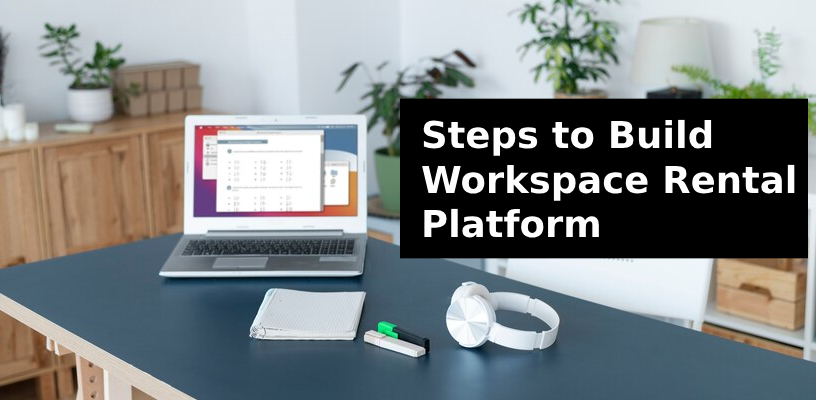Steps to Build Workspace Rental Platform

Whether you’re a real estate company with underutilized properties, a co-working space looking to expand, or an entrepreneur looking for a new venture, the concept of a workspace rental platform opens up a world of possibilities. These platforms connect businesses with those offering flexible workspaces and it creates a win-win scenario for both parties. So, let’s explore how you can tap into this growing market and create a platform that empowers businesses and drives revenue.
Step 1: Define Your Target Market and Niche
Identifying Business Needs
The first step on your journey to workspace rental is to understand your audience inside and out. Begin by delving into the unique workspace needs of different industries and company types. For example, startups might prioritize vibrant coworking environments that foster collaboration and networking, while remote teams might seek out quiet, distraction-free private offices. On the other hand, enterprises may require satellite offices in strategic locations to accommodate their geographically dispersed workforce.
Choosing Your Focus
Once you’ve understood the needs of your potential customers, it’s time to focus on your platform. Will you specialize in catering to a specific niche, such as co-working spaces for tech startups or creative professionals? Or will you cast a wider net, offering diverse workspace types to appeal to a broader audience?
Competitive Landscape Analysis
To make an informed decision, it’s crucial to analyze the competitive landscape. Examine existing workspace rental platforms in your chosen niche or target market. What are they doing well? Where are they falling short? Are there any untapped opportunities or unmet needs that your platform could address? By identifying gaps in the market and potential areas for differentiation, you’ll be well-positioned to carve out your unique space in this thriving industry.
Create Your Custom Workspace Rental Platform
Step 2: Develop a Sustainable Business Model
While the concept of a workspace rental platform might seem straightforward, building a sustainable and profitable venture requires a well-thought-out business model. Here’s how to lay the foundation for your platform’s success:
Choosing Your Revenue Model
The revenue model you choose will significantly impact your platform’s financial health and the value proposition you offer to users. Here are the primary options to consider:
Membership Fees: This model involves charging users a recurring fee (monthly or annually) to access the platform and its listed workspaces.
Pay-Per-Use: In this model, users pay for each individual booking or usage of a workspace.
Hybrid Model: A hybrid approach combines membership fees and pay-per-use elements, balancing steady income and user flexibility.
Calculate Operation Cost
Running a workspace rental platform involves various costs that need to be factored into your business model:
Rent and Utilities: These costs are unavoidable if you manage physical workspaces. Consider rent, maintenance, utilities, and insurance.
Staffing: Depending on the scale of your platform, you might need customer support representatives, marketing professionals, and technical staff.
Marketing and Advertising: Promoting your platform requires investment in digital marketing, content creation, and potentially paid advertising campaigns.
Software and Technology: The platform itself requires ongoing maintenance, updates, and potential subscription fees for software.
Setting Competitive Pricing
Your pricing strategy is a delicate balance between profitability and attracting users. Consider the following:
Competitor Analysis: Research existing platforms to understand their pricing models and identify gaps where you can offer a competitive advantage.
Value Proposition: Clearly communicate your platform’s unique benefits that justify your pricing.
Pricing Tiers: Offer different pricing tiers or packages to cater to diverse user needs and budgets.
Partnering for Growth
Strategic partnerships can expand your platform’s reach and enhance its value proposition. Consider collaborations with:
Coffee Shops and Cafés: Offer discounts or special packages for platform users at partner locations.
IT Service Providers: Partner with IT companies to provide technical support or equipment rentals to your users.
Catering Companies: Collaborate to offer meal options or catering services to businesses booking workspaces.
Step 3: Building Your Platform’s Infrastructure
A successful build workspace rental platform rests on a solid foundation of technology and infrastructure. Before diving into features, you must first make a fundamental decision about your development approach.
Platform Development: Choose Your Way
From Scratch: A platform built from scratch offers maximum flexibility and control over the entire development process. You can tailor every aspect of the platform to your specific vision and business goals.
White-Label Solution: White-label platforms provide a pre-built framework you can customize with your branding and select features. This option is faster to deploy and more cost-effective.
The choice between these approaches depends on your budget, timeline, and desired level of customization. Whichever path you choose, the following platform features are essential for delivering a seamless user experience and driving business success.
Recommended Platform Features
To attract and retain both hosts and users, your platform must offer a comprehensive suite of features that cater to their specific needs.
Core Features
Listing Management: Empower hosts to showcase their workspaces effectively. This includes detailed descriptions, high-quality photos, a comprehensive list of amenities (Wi-Fi, printing, coffee, etc.), pricing information, and availability calendars.
Search and Filtering: Users need an intuitive search interface to find the perfect workspace quickly. Implement advanced filters for location, workspace type (e.g., private office, open desk, meeting room), capacity, price range, amenities, and even specific requirements like pet-friendliness or accessibility.
Booking and Payment: Integrate a secure online booking system with multiple payment options to streamline the reservation process for users. Allow hosts to manage their bookings and track payments efficiently.
Communication: Facilitate seamless communication between hosts and users through a messaging platform or integrated chat. This enables users to ask questions, request tours, or clarify details before booking.
Reviews and Ratings: Foster trust and transparency by allowing users to rate and review their workspace experiences. This feedback is invaluable for both hosts and future users.
Additional Features to Enrich User Experience
Membership Plans: Offer tiered membership options to attract recurring users and incentivize long-term bookings.
Analytics and Reporting: Provide hosts with detailed reports on booking trends, revenue, occupancy rates, and user demographics. This data helps them make informed decisions about pricing and marketing.
Integrations: Seamlessly connect your platform with popular calendar apps, customer relationship management (CRM) systems, and accounting software. This simplifies workflows for both hosts and users.
Create Your Custom Workspace Rental Platform for Large Enterprises
Step 4: Marketing Strategies: Reach Your Target Audience
While building a robust workspace rental platform is essential, it’s equally important to ensure businesses discover and embrace your platform as their go-to solution for flexible workspaces. This is where a well-crafted marketing and customer acquisition strategy comes into play.
Here are some effective channels to consider:
Content Marketing: Publish informative blog posts, articles, and whitepapers that address businesses’ challenges in finding suitable workspaces. Showcase the unique value proposition of your platform and how it solves these problems.
LinkedIn Ads: Leverage LinkedIn’s professional network to reach decision-makers and influencers within your target industries. Create targeted ads highlighting your platform’s benefits for specific business types.
Industry Events: Participate in relevant industry events, conferences, and trade shows. Sponsor or exhibit at these events to network with potential customers, build relationships, and showcase your platform’s capabilities.
Partnerships with Relevant Organizations: Collaborate with business associations, coworking spaces, and other organizations that cater to your target audience. Cross-promote each other’s offerings to expand your reach and tap into their established networks.
Step 5: Operations and Management: The Foundation for Long-Term Success
Exceptional Customer Support
In the digital age, customer service isn’t just a nice-to-have – it’s a dealbreaker. Your platform needs to offer top-tier support to both sides of the marketplace:
Invest in Expertise: Don’t leave support to chance. Build a team that deeply understands your platform, the real estate market, and businesses’ unique needs.
Multi-Channel Accessibility: Offer phone, email, and live chat support during business hours. Consider a chatbot for after-hours inquiries.
Proactive Problem Solving: Don’t just react to issues. Anticipate common pain points and have solutions ready.
Feedback Loop: Gather feedback from both sides of the platform and use it to continually improve your support processes.
Legal Considerations
The workspace rental industry is subject to various legal and regulatory requirements. Thoroughly address these to protect both your business and your users:
Contracts: Create clear and comprehensive rental agreements that define the rights and responsibilities of both parties.
Insurance: Require property owners to carry sufficient liability insurance to protect against accidents or damage.
Local Regulations: Research and comply with local zoning laws, fire codes, and any other relevant regulations.
By ensuring legal compliance, you create a secure environment for all parties and mitigate the risk of costly disputes or legal issues.
Your Partner in Platform Excellence
Building a successful workspace rental platform requires expertise in platform development, marketing, and ongoing management. At Hyperlocal Cloud, we specialize in creating custom digital solutions that drive business growth. Our team of seasoned professionals can help you navigate every step of the process, from concept to launch and beyond.





